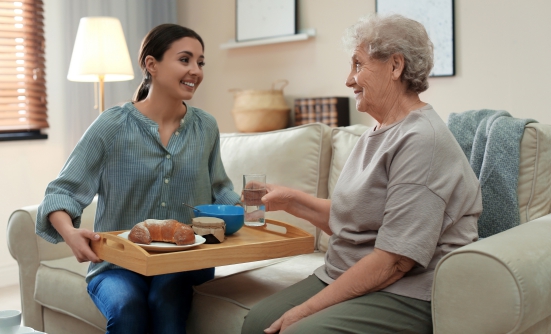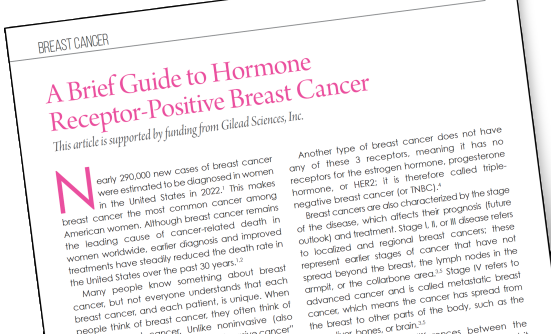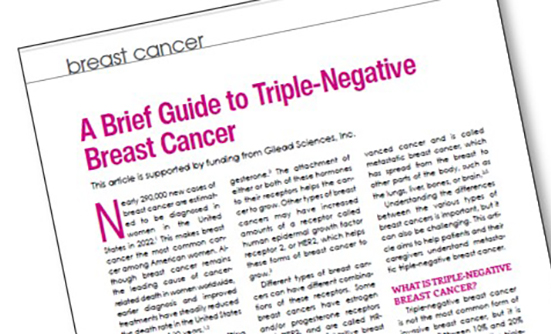Although it was shocking for you to learn that you had breast cancer, it was shocking for your family and friends as well. For a few days no one can really think straight. All you and your family can think about is breast cancer. So, commonly, a lot of time is spent on the Internet trying to figure things out, with the goal of getting a handle on this disease. The Internet, however, has good information and not so good information, meaning accurate and grossly inaccurate, which further complicates matters.
Someone within your family needs to quickly become the primary family caregiver for you. Sometimes they ask to serve in this role, and other times they serve in this role by default. What type of relationship you had with this individual prior to your diagnosis will influence the more intense relationship that is now suddenly being formed as you begin your journey of getting your breast cancer treated.
You will experience a lot of support—physical, emotional, financial, and psychosocial—from your multidisciplinary treatment team, especially your breast cancer navigator. Your family caregiver needs help too, beyond just getting educated about your treatment plan. A family caregiver is usually very distressed that their loved one has been diagnosed. They know that they will be expected to do more things as a result of this diagnosis. Remember, too, that nothing in their routine schedule is going to magically go away. They are adding duties to their likely already pretty full schedule. Unfortunately, the surgeon, medical oncologist, and radiation oncologist oftentimes do not ask the family caregivers how they are doing; all of their attention is on you. So, for your family caregiver to be able to manage this new role that has happened overnight, there are several things that should happen:
- First, decide who you want to be your primary family caregiver. If you are married, then this likely is your spouse/partner. Your mother, however, who is very upset that you have been diagnosed may want to push her way into this role, feeling guilty that something went wrong in your childhood to cause you to have breast cancer now. If you have several sisters, you might be choosing among them. This is complicated, because you do not want to hurt anyone’s feelings. However, you do want your family caregiver to be someone who knows you well, hopefully has additional time in their day to take on extra tasks on your behalf, is a good listener, won’t try to control your situation, and who can accompany you to your appointments when needed. So, think this through before asking the family member you want to assume this very significant role for you, and be prepared to explain to other family members why you chose this person.
- Request patient educational information from your nurse navigator about what treatments you will likely be receiving, in what order (eg, surgery first then chemotherapy, or perhaps chemotherapy first then surgery), what to expect to happen during each phase of treatment, how soon treatment will be underway, whether you can work while receiving specific phases of your treatment, and at which appointments and treatments will you need your family caregiver to be present (ie, day of surgery, whether having mastectomy or lumpectomy, you will need your family caregiver with you to bring you and to take you home). The caregiver also needs to learn how to take care of you and your surgical site, how to recognize if something warrants calling the doctor, etc. Your family caregiver will not need to come to every single appointment or accompany you to every treatment. For example, the consultations when you first meet each of the oncology specialists are times that you will want someone with you to be a recorder of information for you. You ask the questions, and he or she writes down the responses the doctor(s) are giving you. Sometimes the caregiver also has questions about their role in taking care of you after various treatments, such as chemotherapy infusions. If you are going to receive radiation to the breast, you will likely be able to take yourself to and from the radiation facility, as well as work throughout that phase of treatment by getting your therapy before or after your workday. Keep yourself and your caregiver away from the Internet. If you or your loved one want to surf (husbands are known for spending hours online looking up information), then ask your navigator for a list of credible websites that do have accurate, useful information. Your caregiver should not be with you every waking moment. They still need to be doing what they need to get done, whether that is working themselves, taking care of their family, perhaps going to night school, or whatever fills their day. That’s why it’s important to have the navigator sit down with both of you and map out what will likely be your treatment plan schedules, which times your caregiver will be needed for your consultations or other clinic appointments, as well as to what degree they will be needed after surgery to help you, or after chemotherapy when side effects kick in, etc.
- Your caregiver deserves a lot of praise. They are usually going above and beyond to help you. Let them know how much you appreciate them helping you.
- It is impossible to put 10 lbs of salt into a 5-lb bag, meaning, there are only so many hours in the day and only the ability to accomplish a certain amount in a given time. There is nothing wrong with recruiting other family and friends to help you and your caregiver. Caregivers can feel guilty, as if they should be able to do it all. That is not realistic. So, sit down together and make a list and a calendar of what needs to happen when, and who can help to do it. For example, if you have a son who needs to be picked up from band practice on Monday and Wednesday evenings after school, see about recruiting another mom whose child also has band practice, who you know well and lives relatively near you, so she can pick up your son too. Request friends to fix you casseroles (healthy choices please) to put in your freezer. If yard work needs to be done, and you are usually the one doing it, recruit a teenage boy to substitute for you. Paying him will be worth it. Spreading out the chores will make it easier on everyone. And friends will also want to help you. Telling them that you “will get back to them” is not a good idea because you likely will not call them back. Giving them an assignment makes them feel better too. Their turn will come in the future when you will be helping them. It will likely not be due to breast cancer, but it will still happen for some other serious reason.
- Family caregivers abandon their own health needs while taking care of a loved one. This is not good for them. They need to stay on track for their own cancer screenings, still exercise, still eat a balanced diet, and still do activities that help reduce their stress. What more commonly happens is that the caregiver cancels going to the gym, eats due to feeling stressed (which means high-fat and high-calorie foods), is not sleeping well, and only has time to go from one task to another. Push your family caregiver to exercise regularly. A great exercise for both of you is power walking. Power walking during chemo and during radiation has proved to reduce chronic fatigue that is caused by those 2 types of treatments. It is good exercise for your loved one’s heart, and it is a way to reduce stress. Caregivers on average gain 12 lbs while living in the home of the patient. This is because of more sedentary behavior, eating pies and cakes brought over by well-meaning friends who assume you will be losing weight during treatment, and not sleeping well. If your family caregiver is already not in good physical shape, you might be the inspiration to get them to take better care of themselves while caring for you, because doing the things listed above are also ways to reduce the risk of getting cancer. Given that 1 in 2 men and 1 in 3 women will be diagnosed with some type of life-threatening cancer in their lifetime, now is the time to inspire changing lifestyle behaviors as a family.
- Family caregivers need respite. This means that they need to have some days that are totally for them. They need to have an evening of quiet. An afternoon at the movies. Go to a ballgame with the guys. Go see a musical with their best girlfriend. They need their brain thinking about fun things and not about you 24/7. If your husband is your family caregiver, order online for him to get a Swedish massage at a local spa. If your sister is your caregiver, get her a gift certificate for a manicure and a pedicure.
- For most patients with breast cancer, treatment has a beginning and an end. That means that everyone knows when your treatments will be done, and things can begin to get back to normal in your and their life. However, for those patients with stage IV metastatic breast cancer, there is no end to treatment. That means being a caregiver is a permanent thing. In such situations there really needs to be several caregivers for you, so that not just one person is trying to juggle everything forever. You and they are also more stressed because of the inability to achieve a state of eventually being cancer free. Caregivers have many worries that they are not going to share with you because they just “don’t want to go there.” As one treatment stops working and you begin a new one, the length of time that the new treatment works may be shorter than the prior treatment you just finished. This means that it is important to have frank, honest discussions about the future and what likely will happen—when and how to handle specific things that you need to address. There is a strong tendency to avoid having these discussions. You do not want to talk about it, and neither does anyone else in your family. However, this is one of the best ways for you to gain some control over your situation. Planning for the future for your children’s needs, and how you want to decide when you will stop treatment and enroll in hospice care need to be discussed. When they are not, things can go sour fast, and what the patient wanted done never becomes known. This must be your call and no one else’s. Family caregivers have a tendency to be planning for a miracle to happen and really push their loved one to continue receiving heavy-duty treatments that frankly may shorten your life rather than extend it. You need to be in charge. This is your life and no one else’s. You need to decide for yourself what criteria you want to use to determine when you want to stop treatment, because treatment for treatment’s sake is bad care. Without an end-of-life plan, the family is left to guess what their loved one expected of each of them. That is unfair to everyone, including you. So, having affairs in order is important and, frankly, if you have stage I breast cancer you should still have your legal and financial affairs in order, as should your family caregiver, because you could be in a fatal car accident. It happens. Do not leave things to chance. Again, these are things you can control, so do it. See about attending a metastatic breast cancer retreat. These programs, which are free to attend, are 3 days and 2 nights, and some are for couples while others are specifically for the patient to bring their female caregiver with them. These are usually run by nurse navigators. They provide networking opportunities, information on new clinical trials, spouses get to talk privately with other spouses, respite time is provided for everyone, stress reduction and other activities are provided, as well as a serene environment conducive to relaxation and allowing yourself to exhale. How to prepare for the future is also discussed so everyone has an idea how they can plan for the future for themselves and for their loved ones as well. For more information about these retreats, send me an e-mail at
This email address is being protected from spambots. You need JavaScript enabled to view it. . - For those with early-stage breast cancer, when your treatments are all done and you are beginning to re-engage in your life’s routine activities again, do not be surprised if you are looking at the world in a different way. After all, this was a life-altering experience. You may not feel like sweating the small stuff anymore. You need to be open and honest with your family, especially the family caregiver who has been supporting you along this journey. If you do not express how you are feeling and viewing your future, they will become confused and not really understand what has happened. Even though they witnessed everything for the past 6 to 9 months, they were not inside your mind. It is very common that the diagnosis and treatment of breast cancer changes your life. Hopefully for the better. However you now view the world, express your thoughts and feelings to others in thoughtful ways so they can get to know the new you.
- Take the time to truly thank your family caregiver for all that they have done, and likely sacrificed, to be your primary caregiver for many months. A handwritten letter (not a text or an e-mail) accompanied by a gift certificate for something you know they will enjoy can be a thoughtful way to reach the conclusion of this extraordinary journey that no one planned for but weathered together anyway.














